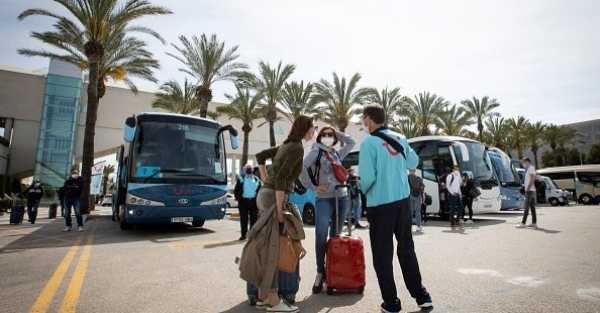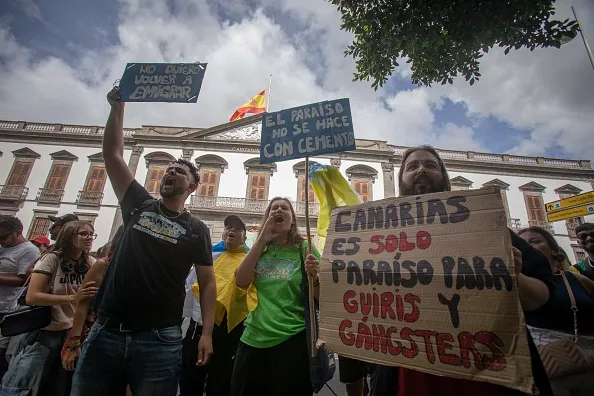
Campaigners against mass tourism are threatening to collapse Majorca’s busy international airport and protest outside hotels.
The radical tactics were put forward at a ‘citizen’s assembly’ on Friday at a school in the inland town of Sineu.
Association Menys Turisme, Mes Vida, which translates into English as “Less Tourism, More Life”, organised the meeting to prepare the way for a large protest against so-called tourist massification and the effect it has on the lives of local people. More than 300 people took part in the brain-storming session.
The idea of a protest at Palma Airport, one of the busiest in Europe during the peak summer months, involving cars massing outside and causing traffic gridlock was greeted with rapturous applause.
No date was finalised for the demo and nothing set in stone but activists showed they were serious about the airport proposal by discussing its legal implications and the wisdom of setting up a fund to pay fines levied by the authorities.
Activists promised an “intense summer” at the packed meeting held at Sineu Secondary School.
Local media reported around 30 people had been forced to watch from the entrance doors because they couldn’t fit into the assembly hall.
The idea of protests outside island hotels was also put forward.
The meeting ended with organisers suggesting more proposals should be registered in writing in the coming days before a final decision on a “massive demonstration” in the next few weeks is taken.
A separate protest against ‘tourist overcrowding’ next Saturday in Palma has already been announced.
An organisation called Banc del Temps has organised the event under the slogan ‘Mallorca no se vende’ – Spanish for “Majorca is not up for sale.”
A group called Prou has organised a protest which will take place on the neighbouring island of Ibiza on Friday night against the “stress” mass tourism brings.
Activists are calling on everyone who supports a “sustainable Ibiza” to join them and have flagged up the problems of lack of affordable housing and packed public spaces as issues they want to combat.
Thousands of people in the Canary Islands took to the streets of the Atlantic archipelago last month to protest against the problems caused by mass tourism and demand their politicians take action.
Government officials in Tenerife, where protestors held up banners which said: ‘You enjoy we suffer’ and ‘Tourism moratorium now’, said around 30,000 people had taken part but organisers put the figure at 80,000.
Anti-tourist graffiti has appeared in both Majorca and Tenerife in recent weeks.
Last month the words ‘Go Home Tourist’ were scrawled in English over a wall underneath a real estate promotion billboard in the Majorcan neighbourhood of Nou Llevant, which has undergone massive transformation with most new properties being snapped up by Germans.
It was billed as a smaller version of San Francisco’s Silicon Valley when the transformation of the neighbourhood five minutes from Playa de Palma got underway.
Locals have been echoing some of the same complaints protestors in the Canary Islands have been making, claiming code-operated key lock boxes have appeared on many of the entrances of new apartment blocks.
One Spanish woman interviewed under a fictitious name in an island paper last year complained it was difficult to communicate with neighbours because most only spoke German and the majority of apartments where she lived were being purchased as holiday homes or rental investment properties.

Thousands took to the streets in Tenerife last month in protests over mass tourism. The signs read ‘Paradise can’t be made of cement’ and ‘Canarias is paradise for tourists and gangsters’. Photo: AFP via Getty
Campaigners in Tenerife were quick to distance themselves from anti-tourist graffiti which appeared on walls and benches in and around Palm Mar in the south of the island at the start of April.
Messages in English left on walls and benches in and around the resort included ‘My misery your paradise’ and ‘Average salary in Canary Islands is 1,200 euros.’
In an apparent UK backlash, a response left in English on a wall next to a ‘Tourists go home’ message said: “F##k off, we pay your wages.”
A picture was subsequently published in local press showing the words ‘Go Home’ on a hire car in Tenerife.
Canarias Se Agota, the lead platform behind the Canary Islands protests grouping together a number of ecological associations, has voiced demands which include a halt to two controversial hotel projects, an eco-tax and more sustainable tourism.
Some foreign holidaymakers have shown their support for the issues raised by the islanders but others have accused them of biting the hand that feeds them.
Six men and women affiliated to Canarias Se Agota, which in English would translate as ‘Canary Islands on the Brink,’ went on an “indefinite” hunger strike on April 11 outside a church in the town of La Laguna in northern Tenerife.
It was called off after 20 days, with one of the activists who stopped eating saying as the decision to end the radical action was announced: “We’ve been amazed at the social response and that’s the best thing we’ll take away from this. I’m very hopeful for the future.”
Sourse: breakingnews.ie